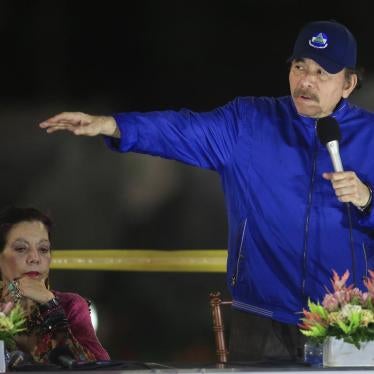We welcome the UN high commissioner’s strong report, which includes key information on the major human rights problems in Nicaragua. This includes not only impunity for last year’s crackdown on the streets, but also ongoing human rights violations.
The crackdown by Nicaragua’s National Police and armed pro-government groups against protestors that began in April 2018 led to more than 300 deaths and 2,000 people injured. Hundreds were detained. Detainees were subject to serious abuses, in some cases amounting to torture, and denied due process. Impunity for egregious abuses committed in Nicaragua remains the norm.
Nicaragua’s human rights problems did not end when massive protests dissipated in mid-2018. The high commissioner’s report, covering the period August 2018 to July 2019, shows that human rights violations continue. It documents cases of pro-government groups attacking protesters in March 2019, the use of excessive force at time by the National Police against those attempting to demonstrate, and actions that undermine freedom of expression and association. The report notes that, beginning in September 2018, the government has banned public demonstrations by any group critical of the government. The government has stripped nine non-governmental organizations of their legal registration, shut down media outlets, prosecuted journalists under the anti-terrorism law, and expelled international monitors from the country. The Ortega government has harassed and threatened the media, human rights defenders and other members of civil society.
In February, the government and the opposition resumed stalled negotiations. From mid-March to mid-June, the Ortega administration had released nearly 400 people detained in the context of the protests. The majority, however, were released under restrictive measures. It is unclear how many more remain in prison, given the opacity surrounding arrests of protesters. In mid-June, a broad amnesty law for crimes committed in the context of anti-government protests came into force. In spite of carve outs in the law for certain crimes, given the lack of judicial independence in the country, there is a serious risk that the law will be used to shield from prosecution officers responsible for serious abuses in the country.
The Ortega government backed out of negotiations in July and has shown no signs of future participation.
Following the high commissioner’s first report, the Ortega administration failed to hold perpetrators accountable for abuses and instead promoted senior officials who bear responsibility for killings and torture of demonstrators. In response to the high commissioner’s second report, the government has even defended the armed pro-government thugs that participated in repressing protests.
Strong and sustained international pressure condemning human rights violations is key to ending impunity and ensuring justice for the people of Nicaragua. We urge Human Rights Council members to take the opportunity of this report’s findings to actively press the Ortega government to allow international human rights monitors back into the country. Council members should make clear to the Nicaraguan authorities that international pressure pushing for accountability for the Nicaraguan people will not dissipate—and if victims do not find it at home, they will find it abroad.







